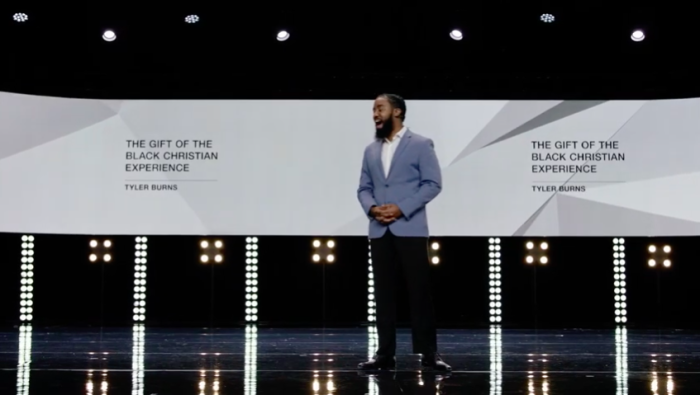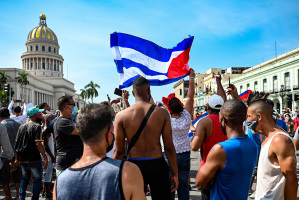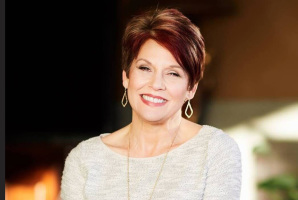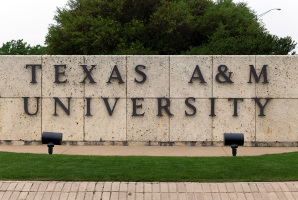Q Summit: Tyler Burns on the 'pain and power' found in the 'paradox' of being a black Christian

Tyler Burns, president of the Witness, identified lessons the Church can learn from the African American legacy and experience and shared how there is “power” to be found in the seeming paradox of being “fully black and fully Christian.”
During a message titled “The Gift of the Black Christian Experience,” Burns told those gathered at the Q 2021 Culture Summit on April 22 that at the age of 19, he was forced to confront the seemingly contradictory condition of being black and Christian.
“I was born black, grew up black in a black family, and was introduced to Jesus at an early age, but sometimes in the life of black Christians, we must confront this reality that ... a black Christian and a black non-Christian will live in the same world and face the same exploitation. Being fully black and being fully Christian sometimes feels like a bit of a paradox.”
For example, Burns said that for many black people, it’s hard to understand how Jesus can be a "healer" when they don't have adequate access to healthcare, how Jesus can be a “provider” when their communities lack economic provision, and how people can claim to love them “but not care about their lives.”
“It feels like a paradox,” he said. “Now the good thing, and the good news for us, is that we are not the first or the only group to have faced this paradox.”
From Moses to Esther, the Bible is filled with people who had to operate and navigate seemingly contradictory identities, Burns said. Similarly, other minority groups like Latin Americans and indigenous people understand what it means to be “ignored” and “forgotten,” he said.
“We're not the only people who have dealt with this. We are just acquainted with the pain and grief. There is pain in the paradox of being fully black and fully Christian,” he said.
As he wrestled with this paradox, Burns came across the words of former slave Sojourner Truth, who, in response to abolitionist Frederick Douglass struggling with the question of why God hadn’t brought “full equality” to the black community, posed the rhetorical question, “Is God dead?”
“Here's the thing about being black and Christian: In the midst of a paradox, yes, there's pain there ... but just because we're in the midst of pain doesn't mean that Jesus is not in the pain with us,” he said.
“Here's the truth. When we were in the paradox we found that Jesus met us in the pain of our paradox, and Jesus addressed our pain, but He also gave us power,” he continued.
“This is the Jesus who can stand at the dead grave of his friend Lazarus and declare: ‘I am the resurrection and the life.’ This is the Jesus who can shed tears and speak to the tomb. This is the Jesus who says, ‘My God, My God, why have You forsaken Me?’ and ‘Into Your hands I commit My Spirit.’ This is the Jesus who met us, and this is the black Christian tradition.
He urged the Church to center black voices to both “find pain” and “find power.”
“In black Christian tradition, we can be prayerful and prophetic, we can be weeping and dancing, we can push for joy and justice. We can say we're not alright, but we are going to be alright as black Christians. We can say that the night may be dark, but the morning is sure to come. It's a paradox, but we found power there.”
A recent Barna survey found that most black adults in the U.S. believe that to understand the African American experience, it's necessary to understand the role of religious faith in black people's lives.
Most members of the black church also believe faith is crucial to the black experience, with half (50%) agreeing “strongly” and 38% agreeing “somewhat.” Faith is also considered a source of emotional strength, with nearly all black churchgoers today “strongly” agreeing with this sentiment.
Previously, Barna reported that most members of the black church believe the church provides comfort and agency, countering a broader sense of political powerlessness.
Last summer, Doug Weaver, professor of Baptist studies and director of the J.M. Dawson Institute of Church-State Studies at Baylor University, told The Christian Post that many churches, particularly white congregations, don’t see racial reconciliation as an actionable priority even though they might acknowledge that it is important.
“It’s not that different racial groups don’t think these issues [of race] aren’t important. It’s that there’s this question of how important they think it is. If you have a hierarchy of values, which ones are most important to you? I do think that’s where the Church at large can be indicted, and that race has not been at the top of the list even though it should be. Churches tolerate racial discrimination. It should never be tolerated, but … history shows that,” he said.





























